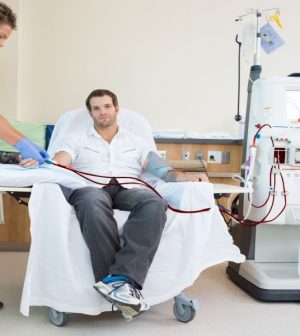- Could Your Grocery Store Meat Be Causing Recurring UTIs?
- Are You Making This Expensive Thermostat Error This Winter?
- Recognizing the Signs of Hypothyroidism
- 10 Strategies to Overcome Insomnia
- Could Artificial Sweeteners Be Aging the Brain Faster?
- Techniques for Soothing Your Nervous System
- Does the Water in Your House Smell Funny? Here’s Why
- Can a Daily Dose of Apple Cider Vinegar Actually Aid Weight Loss?
- 6 Health Beverages That Can Actually Spike Your Blood Sugar
- Treatment Options for Social Anxiety Disorder
Could Profit Be a Factor in Kidney Transplant Decisions?

In a finding that suggests money may sometimes guide whether someone gets a new kidney, researchers report that patients at U.S. for-profit dialysis centers are less likely to receive a transplant.
“For-profit dialysis facilities have a higher profit margin when they have more patients on dialysis,” while nonprofit centers don’t have “the same emphasis on profit margins,” explained senior study author Rachel Patzer.
“Several decades ago, research showed that for-profit dialysis facilities had lower kidney transplantation rates,” she said, so “we wanted to determine if the association between dialysis facility ownership and transplant access has persisted over time.”
Patzer is an associate professor in the departments of surgery and medicine at Emory University School of Medicine in Atlanta.
In the study, her team analyzed data on nearly 1.5 million kidney failure patients treated at more than 6,500 dialysis centers nationwide between January 2000 and December 2016.
Over that time, rates of kidney transplant were lower at for-profit versus nonprofit centers, the study found. For example, just over 1% for patients at for-profit centers and 3.5% for patients at nonprofit centers received a kidney from a living donor, while rates of deceased donor transplants were close to 3% and 7.6%, respectively.
The study also found that almost 12% of patients at for-profit centers were waitlisted for kidney transplantation, compared with nearly 30% of patients at nonprofit independent dialysis facilities.
The study was published Sept. 10 in the Journal of the American Medical Association.
“Patients should advocate for themselves, and ask questions about all treatment options, including transplantation,” Patzer said in a university news release.
“Not all patients are candidates for transplant, but patients should make sure to have these conversations with their medical providers to understand the risks, benefits and steps needed to pursue kidney transplantation as a treatment option,” she concluded.
More information
The National Kidney Foundation has more on dialysis.
Source: HealthDay
Copyright © 2026 HealthDay. All rights reserved.










